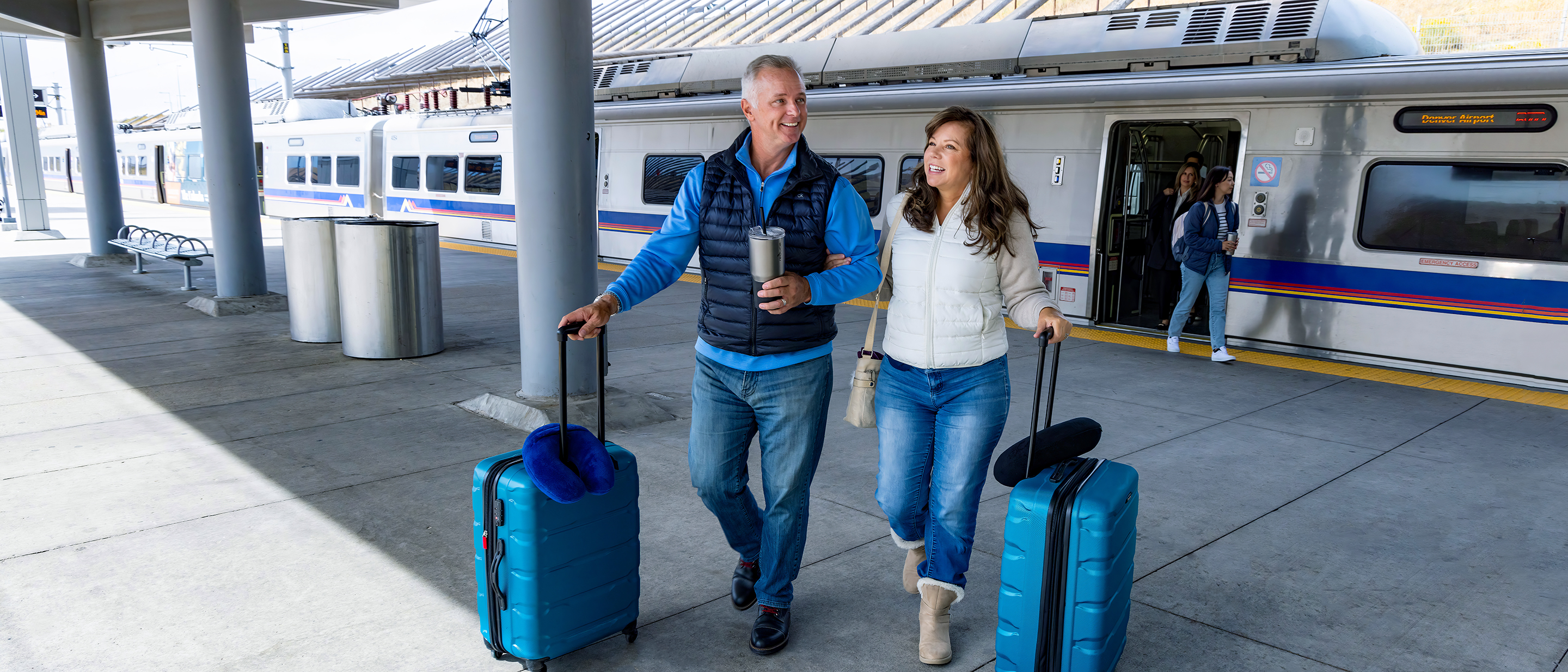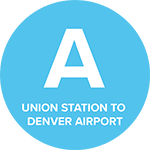
A Line

Facts
- Length: 23 miles
- Vehicle Type: Electric Commuter Rail
- Stations: 8
- Parking: 4,500 spaces
- Frequency of Service: 15 mins (6 a.m. - 8 p.m.) / 30 mins (early a.m. and late p.m.)
- Annual Ridership: 5.9 million boardings (2024)
- Capacity: 300 seated and 100 standing customers (four-vehicle rail consist)
Performance Metrics
Boardings/Ridership
Boardings regularly fluctuate due to many factors, including economic conditions, seasonal demands, remote work trends, service disruptions, large events, and activities. A regularly updated overview of RTD's ridership is available online in the Board Briefing Documents. In 2024, the A Line had an average of 492,000 boardings each month and a total ridership of 5.9 million.
Annual Boardings
On-Time Performance
This is a measurement of how often the A Line train arrived as scheduled. A train is considered “on time” if it arrives no more than one minute early or five minutes late. Many factors can impact the train’s on-time performance, including maintenance work, inclement weather, mechanical issues, accidents, and customer boarding times. In 2024, approximately 93.3% of all A Line trains arrived as scheduled.
On-Time Performance
Service Availability
This metric reflects the percentage of trips that operated as scheduled and were not canceled. There are many reasons that a trip may be missed or not operated, including staffing shortages, vehicle breakdowns, or accidents. Last year, 98.1% of all scheduled A Line trips were operated.
Service Availability
At a Glance
- The A Line was part of RTD’s 2004 voter-approved FasTracks plan to expand transit across the metro area and provide connections to Denver International Airport
- The 23-mile trip between Denver Union Station and Denver International Airport (DIA) takes approximately 37 minutes
- The A Line has eight stations: Denver Union Station, 38th•Blake, 40th•Colorado, Central Park, Peoria, 40th Ave and Airport Blvd•Gateway Park, 61st•Pena, and Airport Station
- The line is part of the larger Eagle P3 project that also includes the B and G lines
Project Overview
- 1997: Plans for rapid transit between downtown and DIA began when RTD conducted an investment study to determine recommendations for commuter rail, light rail, highway widening and transportation management.
- 2003: RTD FasTracks and the Colorado Department of Transportation initiated an Environmental Impact Statement (EIS) process to study improvements to the I-70 East Corridor.
- 2007: Federal Transit Administration (FTA) officials selected the East Rail and Gold lines for a public-private partnership pilot program, which gave birth to the Eagle P3 project.
- 2009: RTD FasTracks released a final EIS; received an FTA Record of Decision, completing the environmental process; and released a Request for Proposals seeking private partners to design, build, finance, operate, and maintain the East and Gold rail lines.
- 2010: RTD FasTracks selected Denver Transit Partners as Eagle P3’s contractor for a 34-year concession.
- 2011: Eagle P3 received a $1.03 billion Full Funding Grant Agreement from the FTA, the largest awarded to date at that time by the Obama administration.
- 2014: The last rail was laid and the first commuter rail vehicles arrived in Denver.
- 2015: Testing, commissioning, and safety compliance began.
- 2016: The A Line opened on April 22, 2016.
- 2019: Established quiet zones along the corridor.
- 2024: The A Line celebrated 50 million customer boardings since its opening in 2016.